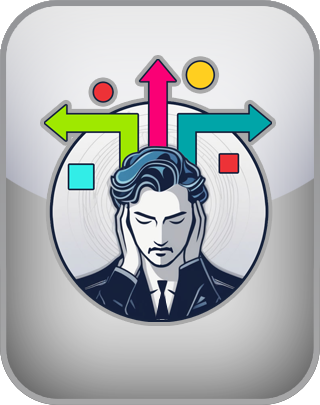Academically reviewed by Dr. Sabina Alispahić, Ph.D., professor of psychology
ASRS-Wender ADHD Test
ADHD, or Attention Deficit Hyperactivity Disorder, is a condition that can make it hard to focus, pay attention, or sit still. People with ADHD may also be impulsive, meaning they act without thinking things through. The ASRS-Wender ADHD Test fuses two famous and well-validated ADHD measures together to indicate whether you have ADHD.
To take the test, indicate your answer to each of the following statements below.
Question 1 of 23
I am often distracted by activity or noise around me.
| Disagree | Agree |
NEXT
The IDRlabs ASRS-Wender ADHD Test fuses two well-known ADHD measures to create a unique, composite test.
Adult ADHD Screening: ASRS and WURS Explained
Attention Deficit Hyperactivity Disorder (ADHD) is a common neurodevelopmental disorder that can persist into adulthood. However, diagnosing adult ADHD can be challenging because symptoms often manifest differently than in childhood. Two common tools used to assess symptoms of ADHD in adults are the Adult ADHD Self-Report Scale (ASRS) and the Wender Utah Rating Scale (WURS).
Adult ADHD Self-Report Scale (ASRS)
The ASRS is a self-administered questionnaire designed for adults (18+) to evaluate current experiences with ADHD symptoms. It's a brief screening tool, typically taking 5-10 minutes to complete. The ASRS asks individuals to rate how often they experience specific inattention and hyperactivity-impulsivity symptoms on a scale ranging from "never" to "often." There are two versions:
- ASRS-v1.1 (Short form): This version consists of 18 items and focuses on the core symptoms of ADHD in adults.
- ASRS-v1.1 (Full form): This version includes 26 items, providing a more comprehensive assessment of ADHD-related difficulties.
The ASRS helps identify adults who might benefit from further evaluation for ADHD. It can be used in various settings, including primary care clinics, mental health facilities, and even online platforms.
Wender Utah Rating Scale (WURS)
The WURS is another self-report questionnaire, but it takes a retrospective approach. It asks adults to recall the frequency and severity of ADHD symptoms they experienced as children. This approach is based on the understanding that ADHD is a childhood-onset disorder, and current symptoms can be better understood by examining a person's childhood experiences. The most commonly used version is the WURS-25, which consists of 25 items.
The WURS helps assess whether an adult's current difficulties might be rooted in childhood ADHD symptoms. It can be a valuable tool alongside the ASRS, providing a more complete picture of an individual's potential ADHD.
Important Considerations
While both the ASRS and WURS are helpful screening tools, it's crucial to understand their limitations:
- Not Diagnostic Tools: Neither the ASRS nor the WURS can definitively diagnose ADHD. A qualified mental health professional should conduct a comprehensive evaluation, which may include a clinical interview, additional testing, and information from parents, teachers, or other relevant sources in childhood.
- Self-Report Bias: Both tools rely on self-reporting, which can be susceptible to bias. Individuals might underreport or overreport symptoms due to various factors, like social desirability or difficulty recalling childhood experiences.
Using the ASRS and WURS Effectively
The ASRS and WURS are most effective when used in conjunction with a comprehensive evaluation by a mental health professional. Here's how they can be beneficial:
- Raising Awareness: The ASRS can help adults identify symptoms they might not have recognized as ADHD-related.
- Screening Tool: Both tests can be used as initial screening tools to determine if a more in-depth evaluation is warranted.
- Providing Context: The WURS can offer valuable context for understanding current difficulties in the light of potential childhood ADHD symptoms.
The ASRS and WURS are valuable tools for adults seeking to understand their challenges and potentially receive an ADHD diagnosis. However, they should be used alongside a comprehensive evaluation by a qualified mental health professional. Early diagnosis and intervention for adult ADHD can significantly improve the quality of life and overall well-being.
Free online quizzes such as the present test do not provide professional assessments or recommendations of any kind; the test is provided entirely “as-is.” For more information about any of our online tests and quizzes, please consult our Terms of Service.
References
- Adler, L. A., Faraone, S. V., Sarocco, P., Atkins, N., & Khachatryan, A. (2019). Establishing US norms for the Adult ADHD Self-Report Scale (ASRS-v1.1) and characterising symptom burden among adults with self-reported ADHD. International Journal of Clinical Practice, 73(1), e13260.
- Adler, L. A., Spencer, T., Faraone, S. V., Kessler, R. C., Howes, M. J., Biederman, J., & Secnik, K. (2006). Validity of pilot Adult ADHD Self- Report Scale (ASRS) to Rate Adult ADHD symptoms. Annals of Clinical Psychiatry: Official Journal of the American Academy of Clinical Psychiatrists, 18(3), 145–148.
- Hines, J. L., King, T. S., & Curry, W. J. (2012). The adult ADHD self-report scale for screening for adult attention deficit-hyperactivity disorder (ADHD). Journal of the American Board of Family Medicine: JABFM, 25(6), 847–853.
- Stanton, K., Forbes, M. K., & Zimmerman, M. (2018). Distinct dimensions defining the Adult ADHD Self-Report Scale: Implications for assessing inattentive and hyperactive/impulsive symptoms. Psychological Assessment, 30(12), 1549–1559.

 English
English  Español
Español  Português
Português  Italiano
Italiano 